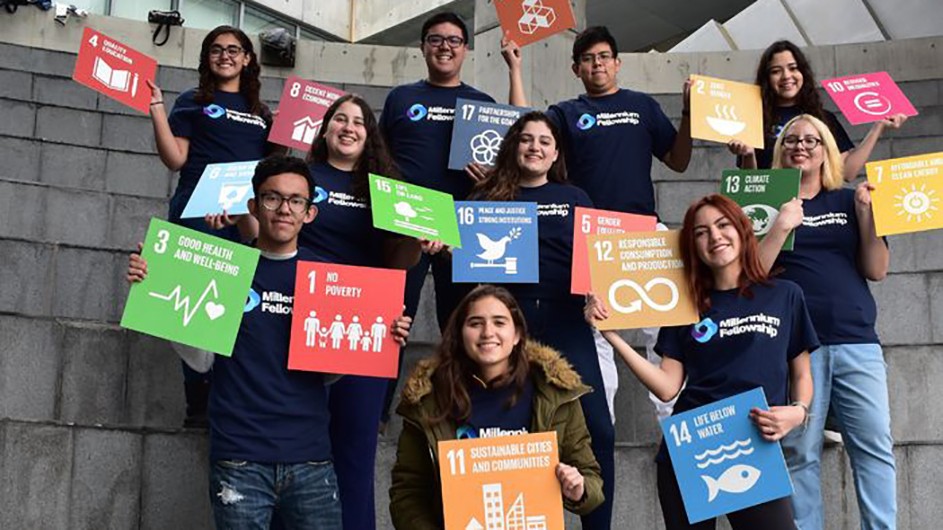Columbia Undergrads Chosen as UN 2020 Millennium Fellows
Meet two of the more than 1,400 students, representing 80 universities worldwide, who are deeply committed to social impact, sustainable development, and climate change.

Jiashi Yang’s interest in sustainable development deepened when she visited her grandparents in Rudong, a small coastal town in China north of Shanghai, during the winter break last year. The beaches where she had spent every childhood summer catching fish and watching sunsets had become severely polluted because of the newly constructed chemical factories nearby.
Yang, a junior at Columbia College, felt compelled to learn more, so she enrolled in Professor Jeffrey Sachs’ The Age of Sustainable Development course, which confirmed for her that choosing sustainable development as one of her majors (along with Russian) was the correct decision.
Isobel Miles, a Columbia College senior, is also majoring in sustainable development. Miles, who grew up in England, says that she has long been interested in the idea of society living within its means without depleting natural resources.
“I’ve always been thinking about more than just what’s in front of me—where supply chains start and where they end up, how my actions and those of others impact the world,” she added.
Yang and Miles, along with 16 other Columbia undergraduates ranging from sophomores to seniors, form part of the newly named 2020 class of Millennium Fellows, a program run by the United Nations Academic Impact and Millennium Campus Network. The program’s purpose is to “convene, challenge, and celebrate” student leaders working toward UN sustainable development goals through social impact. The Columbia cohort joins a total of 1,438 Millennium Fellows this year, who were selected from 80 college campuses worldwide.
Given that Climate Week NYC starts on September 21, now is the time to celebrate Columbia’s Millennium Fellows, who are focusing on sustainable development and climate issues.
Miles has concentrated on classes about sustainable management and environmental policy. One of her favorite courses was Environmental Policy and Governance taught by Professor Lisa Dale. “She really influenced me,” said Miles, and “made me think about sustainable development in terms of my career, how professionals incorporate sustainable goals into their business practices. This major is so fast-moving, forward-thinking, and relevant.”
Climate change has been pervasive throughout Miles’ coursework, and her exploration of the issue through multiple academic frameworks has provided her with a strong sense of its wide-ranging and profound impact on people and ecosystems. In an environmental science lab on climate, she strengthened her understanding of the mechanics of the environmental system; in another class, discussions centered on the social, ecological, and economic inequities that cause climate change to disproportionately affect marginalized communities.
Miles has pursued these interests beyond the classroom by working to promote a strong sustainable development student presence on campus. She is the managing director of Consilience, a biannual publication about sustainable development, with a blog that is Columbia’s leading student voice on sustainability. Consilience also has a student blog on the Earth Institute’s State of the Planet.
After graduation, Miles plans on promoting sustainable behavioral change in people, businesses, and governments through consulting and communications.
Yang grew up reading a lot of Russian literature from her grandfather’s book collection, and developed a fascination with Nabokov, Chekhov, and Akhmatova. In her freshman year, she decided to study Russian as a challenge, but accidentally fell in love with the language.
“I can see my language abilities helping with my long-term sustainable development career goals,” said Yang, who also speaks Mandarin and French. “Even though translators are sometimes present, I’ve heard that many high-impact international projects that aim to advance sustainable development still need people who not only know about the industries, but also speak the local languages. Understanding a language also indicates an understanding of a country’s cultural and political conditions.”
Yang’s extracurricular activities center on sustainable development. She is a managing board member of Consilience, and a research assistant at the Center on Global Energy Policy.
Yang aims to promote sustainability in the energy arena by contributing to the advancement of energy transition. “Energy transition may take various forms in different places,” she said, “but the end goal will always be to achieve decarbonization, which is a recognized core method to combat climate change.”
A list of the 18 Columbia 2020 Millennium Fellows:
Emily Jordan; Senior, Columbia College; Majors: English, Psychology
Maeve Flaherty; Senior, Columbia College; Majors: English, History
Agnes Thornberg; Junior, Columbia Engineering; Major: Mechanical Engineering
Burcu Cetin; Sophomore, Columbia Engineering; Major: Computer Science
Danielle Mikaelian; Senior, Columbia College; Major: English
Emma Barbarette; Sophomore, Barnard; Major: French
Isobel Miles; Senior, Columbia College; Major: Sustainable Development
Jiashi Yang; Junior, Columbia College; Majors: Russian, Sustainable Development
Julia May; Senior, Columbia College; Majors: Economics, Mathematics
Julia Schreder; Senior, Columbia College; Majors: Political Science, English
Leah Collins; Junior, Columbia College; Major: Political Science
Manuel Feigl; Senior, School of General Studies; Major: Economics
May Dittel; Junior, School of General Studies; Major: Human Rights
Morgan Margulies; Junior, Columbia College; Majors: Political Science, Sustainable Development
Rachel Ramenda; Junior, Columbia College; Majors: American Studies, Latin American and Iberian Studies
Thomas Fisk; Junior, Columbia College; Major: Philosophy
Virginia Jiang; Senior, Columbia Engineering; Major: Chemical Engineering
Xue (Shirley) Tan; Senior, Columbia College; Majors: English, History

